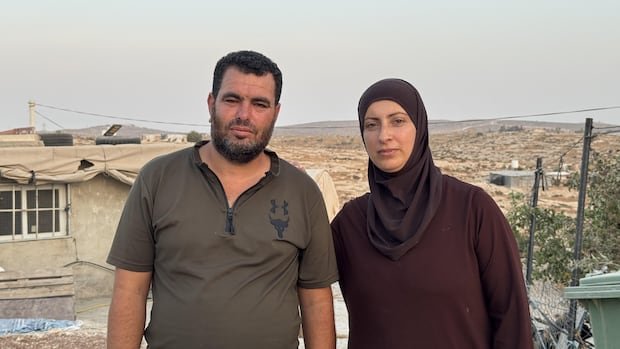The crowded hospital room in Yatta, a Palestinian town in the occupied West Bank, is filled with visitors offering quiet solace to Khader Nawaj’ah. He lays with bruised face and swollen features, while his wife, Fatima, is in the adjacent bed with a sling on her broken arm. The couple recounts an attack by Israeli settlers from a nearby outpost as they slept outside their home in the village of Khirbet Susiya to escape the heat. Khader describes being pelted with large stones and beaten with sticks by the settlers, leaving him injured and in need of medical attention.
Dr. Tareq Abu Aram, who treats victims of settler attacks at the hospital, mentions that incidents like this are not uncommon, with victims arriving for treatment regularly. Since May 2024, the Canadian government has imposed sanctions on individuals and entities involved in extremist settler violence in the West Bank, citing the adverse impact on Palestinian rights, the two-state solution, and regional stability.
Despite these sanctions, investigations reveal that tax-deductible donations from Canadians continue to support West Bank settlements, even amidst escalating violence against Palestinian civilians. Nasser Nawaj’ah, a field researcher for B’Tselem, calls for Canada to uphold international law and crack down on charities funding Israeli settlements, deemed illegal under international regulations.
While most settlers are not directly involved in violence, critics argue that their presence legitimizes such actions. Charitable giving in Canada is meant to benefit the public good, with strict guidelines ensuring donations are used for charitable purposes and not to support foreign military entities. However, investigations reveal that Canadian donations are still funding organizations linked to the Israeli military and settlement expansion in the West Bank.
The ongoing support for these activities has raised concerns about legality and compliance with Canadian laws governing charitable organizations. Despite some charities having their status revoked over similar issues, others continue to operate and send donations that indirectly support Israeli military activities in the West Bank. Concerns have been raised about the lack of transparency and control over where these donations ultimately end up.
Residents of Khirbet Susiya live in constant fear of settler attacks and the potential demolition of their homes, which Israeli authorities consider illegal. The situation highlights the complexities and challenges faced by Palestinians living in the West Bank, with little recourse for justice or protection from ongoing violence. The need for accountability and adherence to international laws remains a pressing issue in addressing the humanitarian crisis in the region.


